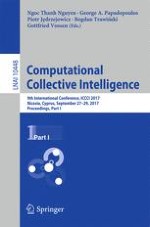2017 | OriginalPaper | Buchkapitel
A Generic Approach to Evaluate the Success of Online Communities
verfasst von : Raoudha Chebil, Wided Lejouad Chaari, Stefano A. Cerri
Erschienen in: Computational Collective Intelligence
Aktivieren Sie unsere intelligente Suche, um passende Fachinhalte oder Patente zu finden.
Wählen Sie Textabschnitte aus um mit Künstlicher Intelligenz passenden Patente zu finden. powered by
Markieren Sie Textabschnitte, um KI-gestützt weitere passende Inhalte zu finden. powered by
